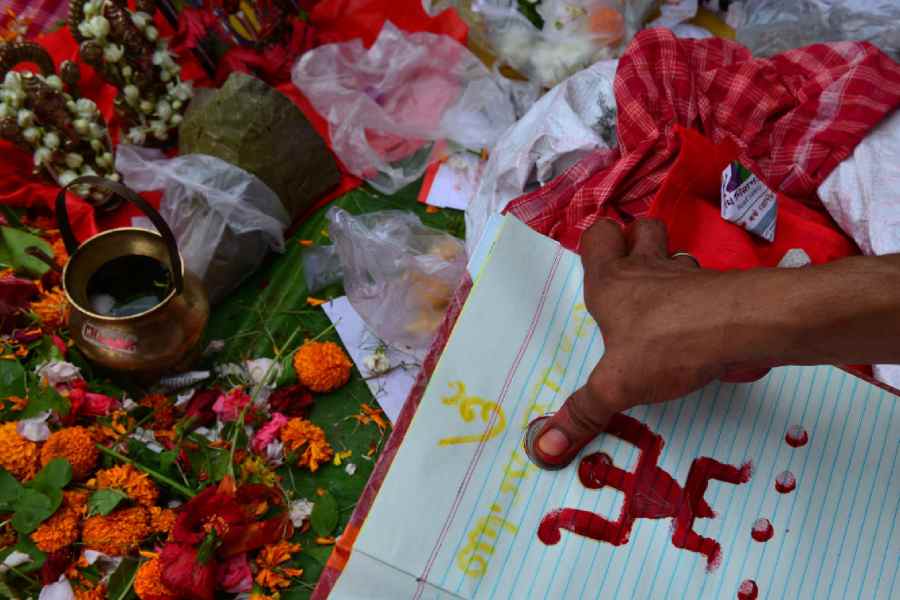There is an interesting self-criticism that is often evoked by the opponents of Hindutva to assess their political failure. It is argued that they could not recognise the significance of Hinduism in India’s public life; instead, they continued to follow Western ideas (such as secularism). This ignorance, we are told, has helped Hindutva’s forces to consolidate their constituency of voters.
There are many versions of this argument. Intellectual politicians such as Shashi Tharoor and Pavan K. Varma have tried to disassociate Hinduism from Hindutva by asserting the inclusive character of the Hindu religious worldview. The appropriation of Hanuman and other Hindu religious figures by the Aam Aadmi Party is also celebrated as an appropriate response to the Bharatiya Janata Party, at least in Delhi. A section of public intellectuals (who used to celebrate their secularism a decade ago!) has even started talking about the need for comprehensive decolonisation for the discovery of an authentic Indian civilisation.
There is an element of truth in this rather delayed self-realisation. It is true that religion and nationalism were never taken seriously by the secular parties and the self-declared Left-liberal public intellectuals. Even the demolition of the Babri masjid in 1992 was not seen as a failure of their politics. Hindutva was blamed for communalism to establish the contention that secularism was an intrinsic and natural feature of Indian social life. In this secular schema, Hindutva-driven communalism was to be opposed without creating any engagement with the Hindu religion. This lethargic attitude gave an advantage to the forces of Hindutva to establish their monopoly over Hindu culture, religion, and civilisation.
However, the decline of secular politics has paved the way for a new political consensus. The entire political class, it seems, has accepted temple-centric Hindu religion as the ultimate reference point to articulate India’s national identity. There is an overwhelming political-intellectual investment in Hindutva, Hinduism, and Indian civilisation to create the impression that religion (particularly, the Hindu religion) is the only possible mode to make sense of Indianness. This religionisation of Indian politics requires serious analytical attention. Two emerging political manifestations of religion are relevant in this regard.
First, the crucial distinction between the moral-philosophical tenets of religious and ritualistic performances must be understood in their entirety. Religious rituals, we must remember, are linked to certain philosophical principles of religion. B.R. Ambedkar makes this distinction in his famous work, Annihilation of Caste. He argues, “… Rules are practical; they are habitual ways of doing things according to prescription. But principles are intellectual; they are useful methods of judging things… when I urge that… ancient rules of life be annulled, I am anxious that their place shall be taken by a Religion of Principles, which alone can lay claim to being a true Religion.” Ambedkar’s principle-centric interpretation of religion encourages an individual to evaluate, engage and even criticise the ritualistic aspects of religion that are often imposed on him/her in the name of spirituality.
The political class in postcolonial India, however, has been quite reluctant to appreciate the distinction Ambedkar makes. In fact, political parties have not shown any interest in the possible recovery of the Religion of Principles. The secular-modernist project of the Congress celebrated the religious performances in the name of Indian culture. It is true that Jawaharlal Nehru’s government was able to implement the Hindu Code Bill. Yet the compulsions of electoral politics forced the Congress to take Hindu sentiments seriously. This carefully-nurtured political move helped the Congress to appropriate the Hindu religious elites in the post-Nehru era. Religion as a cultural framework was also useful to accommodate the Muslim religious elites who were keen to project personal laws as a divine entity. The infamous fatwa politics of the 1970s is a good example of this political trajectory.
The Hindutva project is also interested in ritualistic religion to define Indianness in overtly Hindu terms. The opponents of Hindutva also share this political imagination. They are equally enthusiastic about showing their uncontested faith in Hindu rituals. This political consensus goes well with the established perceptions about Islam as an alien and backward religion. The agenda to reform Islam and, for that matter, the debate on the Uniform Civil Code are not presented to us as possible moves to achieve Ambedkar’s cherished ideal of the Religion of Principles. Instead, ritualistic Hinduism is politically invoked as a source to reform and Indianise other religious communities. This approach is also favourable for the Muslim religious elites. Their position as the only legitimate interpreters of religious texts and protectors of a victimised community gets consolidated.
Second, the institutionalisation of ritualistic religion also makes it a political entity. In the last three decades, many religious places of worship — temples, mosques, churches, maths, ashrams — have been built, especially in metro cities. These new, sacred buildings not merely function as conventional religious sites but they have evolved into community-institutions that provide a set of social services to members of their own religious community. This ever-increasing expansion of religion into the domain of the social world further consolidates the established contours of ritualistic religion. Political parties find this arrangement very useful because they receive organised and, in a way, institutionalised support from religious establishments.
These two features of the growing religionisation of politics — acceptance of ritualistic religion as the ultimate identity marker of a faith community and the institutionalisation of religious establishments—correspond to the emerging form of religiosity. The study by the Pew Research Center, “Religion in India: Tolerance and Segregation”, tells us that a significant majority of Indians envisage religion in overtly ritualistic terms. Factors such as belief in fate and astrology, emphasis on religious ceremonies for birth, marriage, and death, and overwhelming support for religious processions define the contours of the dominant belief system of all Indian religious communities.
This simply means that the Religion of Rules has established its uncontested dominance while the possibilities to explore the Religion of Principles have reduced significantly.
Hilal Ahmed is Associate Professor, CSDS, New Delhi











